Ohio Early Voting Law Grants A Potentially Unconstitutional Preference To Military Voters
The Obama campaign is challenging an Ohio law that gives members of the military three extra days to vote. They have a very persuasive argument.
The Obama campaign, along with the Democratic National Committee, is arousing the ire of some veterans group over the filing of a lawsuit challenging Ohio’s new early voting law that gives a preference to military voters and their families by allowing them to vote up to the Monday before election day while other voters can only early vote until the preceding Friday:
Obama for America, the U.S. president’s re-election campaign committee, sued two Ohio officials over changes to state law that limit in-person early voting for some people and not others.
Under the law, families of armed forces members and civilians overseas can vote through the Monday before an election, while early voting for all other Ohio residents ends on the preceding Friday, a disparity Barack Obama’s campaign claims is unconstitutional. The 2012 election will be held on a Tuesday.
“This lawsuit, at bottom, seeks to treat all Ohio citizens equally under the law,” Donald McTigue, general counsel for the Obama campaign in Ohio, said today on a conference call with reporters after the complaint was filed in federal court in Columbus, the state capital.
Ohio, which has 18 electoral votes, has been a bellwether in U.S. politics and no Republican has been elected president without a victory there. Obama, a Democrat, won the state in 2008 with 51.5 percent of the vote.
The Obama campaign is seeking a court order invalidating the deadline statutes. Named as defendants in its complaint are Ohio Attorney General Mike DeWine and Secretary of State Jon Husted, both Republicans.
The truly odd thing about this is that this is a change in Ohio law. After the 2004 election and the confusion and chaos that resulted throughout the Buckeye State due to very high turnout, the state passed an early voting law that permitted all Ohio voters to vote early right up until the day before Election Day. According to the Obama campaign, as many as 30% of the nearly 6 million people who voted in the 2008 Presidential election voted early under this law. It’s not clear why the law needed to be changed at all, but the reason for the discrepancy seems to be very odd:
The Republican-controlled legislature enacted two laws last year with provisions to move the deadline to the Friday before the election for all voters, then repealed one measure in May to halt a statewide referendum sought by Democrats, the Obama campaign alleged.
“Whether caused by legislative error or partisan motivation, the result of this legislative process is arbitrary and inequitable treatment of similarly situated Ohio voters with respect to in-person early voting,” according to the complaint.
It’s not hard to see a partisan reason behind the discrepancy, of course. As a general rule members of the military and their family members are more likely to vote Republican than Democrat so anything that encourages this particular voting group to vote when it’s convenient would potentially be of advantage to the GOP. Even if we assume that this was part of a legislative mistake, though, that doesn’t really end the argument because there are some serious Constitutional issues implicated here that suggest that the Obama campaign has the better part of the legal argument.
In their Motion For Preliminary Injunction, the Plaintiffs make the following argument:
Here, Ohio’s actions unquestionably result in disparate treatment of voters. In passing HB 224 and SB 295, the Ohio legislature withdrew from the majority of Ohio citizens a previously conferred right to vote in a particular manner – specifically, the right to cast a ballot in the three days immediately preceding an election. And it did so while leaving that right intact for UOCAVA voters. This disparate treatment is significant. As the Supreme Court has acknowledged, the days immediately preceding an election are critical for participation. “It is well known that the public begins to concentrate on elections only in the weeks immediately before they are held,” Citizens United v. Fed. Election Comm’n, ___ U.S. ___, 130 S. Ct. 876, 895 (2010). Ohio’s disparate treatment of voters is arbitrary. The State has provided no justification for its decision to withdraw from only one class of voters the last three days of early vting. The statutory text contains no justification; nor do the Committee Reports or the subsequent Secretary of State analysis. This failure is striking, given that the legislature heard testimony highlighting the problem of disparate treatment resulting from the legislature’s maneuvers
In addition, there is no discernible rational basis for the disparate treatment. First, the distinction is not based on voter qualifications. It is uncontroverted that the voters for whom the last three days of early voting was eliminated are otherwise qualified to vote. See Crawford v. Marion Cnty. Election Bd., 553 U.S. 181, 189 (2008) (plurality opinion) (“[E]ven rational restrictions on the right to vote are invidious if they are unrelated to voter qualifications.”). Second, the difference between UOCAVA and non-UOCAVA voters provides no justification for applying a different, more restrictive deadline to non-UOCAVA voters. Of course, overseas voters should be treated differently from non-overseas voters. Indeed, UOCAVA itself represents a response to the special difficulties that confront members of the military stationed away from their home counties and other overseas citizens. It was enacted to facilitate absentee voting by a group of citizens who are often not present in the area in which they vote. But here, the laws at issue govern only in-person early voting, and there is no reason why all voters should not have the benefit of the extra three days. Moreover, any suggestion that the current scheme was designed to benefit UOCAVA voters is undermined by what the legislature actually did in enacting the three bills at issue. In amending its election laws, it also created two different, and conflicting, deadlines for UOCAVA voters: 6 p.m. on the Friday before an election, Ohio Rev. Code § 3511.02 (as amended by HB 224), and the close of the polls on Election Day, Ohio Rev. Code § 3511.10 (following the repeal of HB 194 by SB 295). The enactment of a more restrictive deadline for UOCAVA voters as well demonstrates that the disparate treatment is not justified by some interest in protecting the voting rights of UOCAVA voters.
UOCAVA refers to the Uniform Overseas Citizens Absentee Voting Act, the 1986 law that was passed to create a uniform system by which American citizens who are overseas, whether they are in the military or not, can exercise their right to vote via absentee ballot. There are frequently arguments raised under this law after a particularly close election over the question of whether or not state’s should be required to accept overseas absentee ballots after Election Day. The general rule, of course, is that only absentee ballots received by Election Day will be counted as valid. But that’s not the issue here. We’re not even dealing with members of the military deployed overseas. We’re dealing with a law that says that members of the military living in Ohio on Election Day, and their families, will have three extra days to vote early that other citizens of Ohio will not be permitted to take advantage of.
On the surface, there doesn’t seem to be any justification for this kind of disparate treatment. What is it that distinguishes a member of the military, or their family members, from regular voters to the extent that it should be acceptable to give them three extra days to vote early? It’s hard to see any plausible answer to that question that would withstand legal scrutiny, and the argument made by the Ohio Attorney General in his responsive pleading doesn’t strike me as persuasive:
It is also important to note that courts have recognized the distinctions that exist between UOCAVA voters and non-UOCAVA voters. In Bush v. Hillsborough County Canvassing Bd., the court emphasized that UOCAVA voters “do not enjoy the individualism which they serve to defend for all other citizens. How and where they conduct their lives is dictated by the government. The vote is their last vestige of expression and should be provided no matter what their location.” Bush, 123 F. Supp.2d 1305, 1307 (U.S. District Ct., N.D. FL, 2000). Accordingly, the court acknowledged that “[f]or the members of our military, the absentee ballot is a cherished mechanism to voice their political opinion.” Id. Similarly, in Doe v. Walker, the Maryland District Court addressed the deadline by which UOCAVA ballots could be received by mail. In extending the deadline for receipt, the court recognized the unique circumstances that UOCAVA voters face: “[U]nlike domestic absentee voters who may request an absentee ballot because it is inconvenient or difficult for them to vote at a polling station, military personnel deployed overseas lack the ability to vote in person. Voting by absentee ballot provides these men and women with their only meaningful opportunity to vote in state and federal elections while they are deployed abroad.” Doe v. Walker, 746 F.Supp.2d 667, 679 (U.S. Dist. Ct. MD, 2010). Because UOCAVA and non-UOCAVA voters are not similarly situated, states have a rational basis for accommodating UOCAVA voters because of their unique circumstances.
Just as there is a rational basis to permit accommodations for the mailing and receipt of UOCAVA ballots, the Ohio General Assembly has a similar rational basis to allow UOCAVA voters the opportunity to cast an absentee ballot in person at the board of elections during the last weekend before Election Day while not extending that same deadline to others. The Ohio General Assembly recognizes the nature of deployment, which can happen abruptly and unexpectedly. For instance, members of the National Guard can be called up to active duty in order to respond to disasters, whether man made or natural. These call-ups can occur at a moment’s time without any warning.
As initially noted, from the beginning of our Republic, military voters have had special problems in obtaining ballots and casting them. Ohio’s laws, allowing UOCAVA voters the ability to cast an absentee ballot after the time during which non-military and domestic voters may do so has closed, rationally recognizes the unique circumstances that military voters may face. The General Assembly has provided a statutory scheme that accommodates that possibility.
The brief also cites two Federal Court cases, including one from the Supreme Court that essentially stand for the proposition that the state’s can limit who is entitled to an absentee ballot to people who actually expect to be absent from their county of residence, or sick and unable to go to the polls, on Election Day. It strikes me, though, that both of those cases are inapplicable to this case. Nobody is arguing that the Constitution requires a state to adopt universal absentee ballot access for any reason, or that it adopt early voting if state law doesn’t provide for it. For one thing, the Constitution gives the states broad authority of the “time, place, and manner” of Elections limited only by the requirements that government when elections for the House, Senate, and President will take place. In this case, though, the state has amended its early voting statute to give special preference to a specific group of voters.
The state argues that this is justified by the provisions of the UCOAVA and the general accommodations that have been given to military voters in the past, including extending the time for military ballots to be received beyond those of ordinary absentee ballots. As Court have noted, though, those accommodations are acceptable precisely because of the unique situation that deployed members of the military find themselves in being thousands of miles from home and unable to return home to vote.
This argument only really makes sense, it seems, if we’re talking about members of the military who are on the verge of being deployed, something they’re likely to know about well before the three days before Election Day unless we’re talking about a deployment made necessary by a foreign crisis of some kind. If the soldier in question is stationed in Ohio, or the member of the Reserves or National Guard is at home, there is no rational reason for the State of Ohio to give them a preference not available to other voters. Indeed, if the interest that the state cites in this brief is truly the one that motivated the legislature then it would make more sense if they had created a scheme whereby members of the military in Ohio who are given deployment orders that require immediate deployment, then they can vote early in-person at any time prior to Election Day. That would likely be constitutional, but giving such a broad preference to such a broadly defined group when most of the members of that group will likely still be in Ohio on Election Day makes no sense to me. If early voting up until Friday is okay for other Ohio citizens, it’s okay for members of the military. Alternatively, the legislature can go back to the way things were before 2011 when everyone could vote up until the Monday before Election Day. What they cannot do, though, is treat essentially identical groups of voters differently.
This will be an interesting case to keep an eye on.
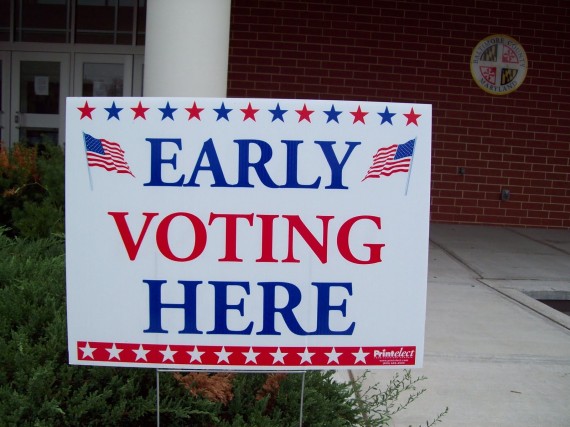

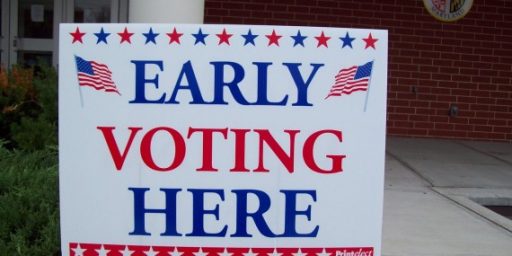
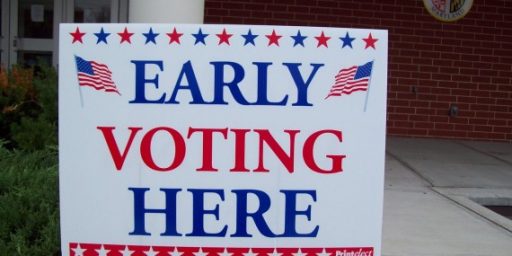

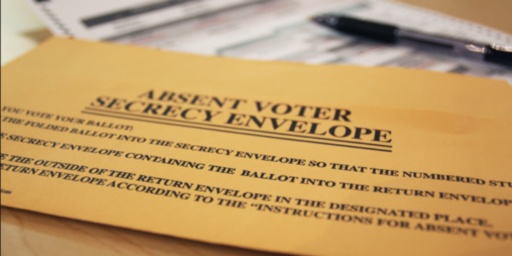
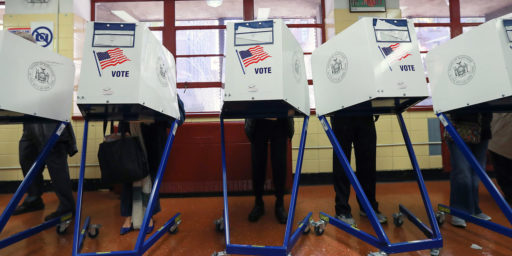
Sounds like they were very concerned with the rampant fraud involved in voting for Democrats…
I guess at least 100 citizens have been flushing their cash down the toilet…
“As of July 30, super PACs spent more than $165 million. The top 100 donors to super PACs gave $193 million out of $318 million raised at the end of June — more than 60 percent of the total.”
http://www.washingtontimes.com/news/2012/aug/2/election-set-to-be-most-expensive-in-histry/
Bloomberg and Doug reported this correctly, that the statute being challenged took three days of early voting away from everyone except military. At Breitbart they spun this completely backwards, claiming Obama was challenging granting the military an extra three days, drawing the justifiable ire of Kay, at Balloon Juice.
http://www.balloon-juice.com/2012/08/03/correction-2/
And Tim F has more. The GOPs in Ohio are trying to restrict in-person voting hours in Democratic areas. http://www.balloon-juice.com/2012/08/03/neat-trick/
Doug says,
Not hard at all. How much of this do we get before management here admits all this and all the voter ID stuff is just ratfracking.
As ex-military who lived in Ohio, I don’t even buy the basic premise. If your active duty in Ohio, it is pretty easy to get time off to go vote. Which is a privilege a lot of civilians do not have.
I can’t see a way this gets past the precedent of Bush v. Gore. You simply can’t have different voting standard, different voting periods for different groups of people. Let people vote through the Monday and that’s that.
@gVOR08:
Balloon Juice is all over this. Now the Romney campaign is following Breitbart’s lead and spinning the story backwards. http://www.balloon-juice.com/2012/08/04/romney-campaign-lies-about-ohio-voter-suppression-lawsuit-filed-by-obama-campaign/
Just freaking wonderful. Read the first and third comments.
James, is there one single significant thing your boy Mitt, Count de Monet*, hasn’t lied about?
* The Harvey Korman character in Mel Brook’s History of the world, Part Two. “Count da Money”.
@gVOR08:
But, but, but both sides do it!!!
And making it way harder for thousands of citizens to vote isn’t “despicable” behavior, only accusing the super rich of paying a small % of their income in taxes is “despicable”.
Nate Silver has Romney’s chance of winning in the high twenties. A rigged game may be the GOPs best shot. They have certainly put in the hours.
I think it’s pretty clear that the special preference is going to have to go. However, the Obama campaign is also asking the court to venture into “time, place, and manner” by asking the court to order Ohio to reinstate early voting for the three days before the election for all voters. I don’t see how that remedy is constitutional. I’m not unsympathetic to the issue of educating voters about an election rule change, but that would have to rise to a very, very high standard or states would never be able to change election rules at all.
@gVOR08:
Fox is misreporting it left & right too, even on their “hard news” segments. The Hill totally blew it as well.
Apparently…when you don’t have an argument to make…you have to make up lies.
Not since Sarah Palin have I seen someone so comfortable with lying.
In one appearance on Friday Romney condemned Obama for false claims.
Then in the next appearance he doubled-down on the Big Lie about “You didn’t build that”.
I’m not sure how anyone with any integrity at all can support this man.
Apparently…when you don’t have an argument to make…you have to make up lies. — insert picture of Harry Reid here
@gVOR08: “That’s d’Monet! Oh, piss boy…”
@tiptoe: So here is the afterbirth of a meme. For the rest of my life “Yeah, well Harry Reid…” is going to be the boilerplate rebuttal to every single dastardly, anti-democratic action the GOP(ricks) can come up with.
When I think about conservative politics, my mind is immediately drawn to the White Stripes.
“You’re like a little girl yelling at her brother because you lost his ball…”
The military has earned the right to have extra days to vote. The “ordinary citizen” has not. Bottom line: If military traditionally voted Dem, this lawsuit would not have been filed.
@military earned it: Absolutely not. There is no reason any group needs extra days to vote that aren’t available to everyone else.
@military earned it:
Been reading a lot of Starship Troopers, have we?
@military earned it: Did you read Doug’s post? The gops in the Ohio legislature didn’t give three extra days to the military, they took three days from everyone except the military. So in perverted way, you’re right. If the military traditionally voted Dem, the gops wouldn’t have passed this law in the first place, so there would have been nothing for the Dems to protest.
@military earned it:
Bottom line: If military traditionally voted Dem,
this lawsuit would not have been filed.Ohio Republicans would not have voted to shorten everyone else’s voting period by three days.FTFY.
This is America. There are no “special rights.” Do you even know what country you are serving?
@military earned it:
But it’s okay with you because it happens to be your partisan hacks who are promoted and passed this legislation?
Also, as long as we’re on the subject; who else has “earned” this right to a special privilege concerning voting deadlines? Why not our “Job Creators”? How about Doctors?
The one thing that’s fairly certain is that both the new changes to the law and Obama’s lawsuit are being done for purely partisan reasons. Each side believes that military voters are more likely to vote Republican.
@Gradivus:
The one thing that’s fairly certain is that both the new changes to the law and Obama’s lawsuit are being done for purely partisan reasons.
Perhaps, but what is worse, restricting the voting period of the majority of voters for the benefit of a small minority, or equal access for all? Partisan or not, one of those is clearly preferable, democratic, and just. One is not.
” Alternatively, the legislature can go back to the way things were before 2011 when everyone could vote up until the Monday before Election Day.”
Except it’s not true that “everyone could vote up until the Monday before Election Day”. Not even close. Before the new laws, it was left up to the counties to determine the deadline. Each county had the *option* to allow early voting up until the Monday before but was not required to do so (and in fact, the majority of Ohio counties – 82 of 88 – did not .
If disparate treatment of similarly situated voters is unconstitutional, then allowing individual counties to set their own hours and deadlines for early voting should never have been allowed in the first place and the DNC and the Obama campaign should have had the same “constitutional” objections. So it’s factually incorrect to talk about restoring 3 days of early voting to “everyone” (much less taking them away from “everyone but the military”!) when in fact, only 6 of 88 counties possessed those extra days in the first place!
Moreover, civilian and military voters are NOT similarly situated. We’re not just talking about absentee voters here. Lots of factors related to military service make it more difficult for military families to vote.
Vets and their families get PCS orders on short notice. They move every 1-3 years. Vets are deployed on short notice. Their family members do not acquire domicile by virtue of marriage and don’t always qualify to register to vote in their state of residence. For 30 years I moved from state to state with my husband. During that time, I could not swear that I intended to make the state I currently lived, worked, and payed taxes my permanent residence. I could not swear honestly that I would return there one day because I had no idea where I would be living. If we do get a drivers license or manage to register to vote where we actually live, that is often used as evidence that we have abandoned a previous domicile. What this means in practice is that either you change domicile every time you move (if you’re lucky) or deal with having to do everything from getting a drivers license to registering to vote long distance with all the confusion and delay that entails.
Military spouses (especially pregnant ones, or women with small children) often go to live with relatives during long deployments so they’ll have a support network. So in addition to the stress of frequent, unpredictable moves and deployments, they may be trying to stay informed, change or establish a new domicile, and register to vote from a different state or make plans to return to their state of residence to vote in person.
The requirements for military family members to obtain or change domicile are confusing and vary from state to state and the MSRRA doesn’t protect spouses who (like most, myself included) are not domiciled in the same state as their spouse.
Researching all of this every time you move takes time. As an attorney, I am surprised that you don’t know this. “On the surface” judgments of whether two classes of people are similarly situated is no substitute for analysis of their actual circumstances.
@SKI: Except there is a de minimis amount of voter fraud. It is simply amazing that voter ID laws are focused on the swing states and not the solid red states.
Wouldn’t it be great if Utah, Wyoming and Texas had the same ID requirements as Florida, Ohio and Pennsylvania?
@military earned it: As a 24-year veteran and current service member, I could not disagree with you more. I am in favor of giving added flexibility to allow all citizens access to the polls for election, but I am not entitled to “special” or “better” voting rights than the rest of our citizens.
Taking your assertion to the logical conclusion, then the next criteria for earning better voting rights will be financial net worth or education. After all, wouldn’t a person with a PhD or Masters Degree be in a better position to analyze the economic, financial and national security issues facing the country than a high school graduate performing manual labor? Wouldn’t these persons be more likely to be traveling for work and have a harder time getting to the voting precinct on election day? Don’t their employers lose more revenue by having a $250/hour medical malpractice attorney standing in line compared to a sheet metal worker?
The same flexibility given to our military members should be available to all citizens.
@anjin-san: This is America, there are no special rights? Ever heard of Affirmative Action? I have for years. Back years ago they would tell you, we must hire a “special group” to meet a quota. I know, I was there. Nowadays they just can’t tell you.